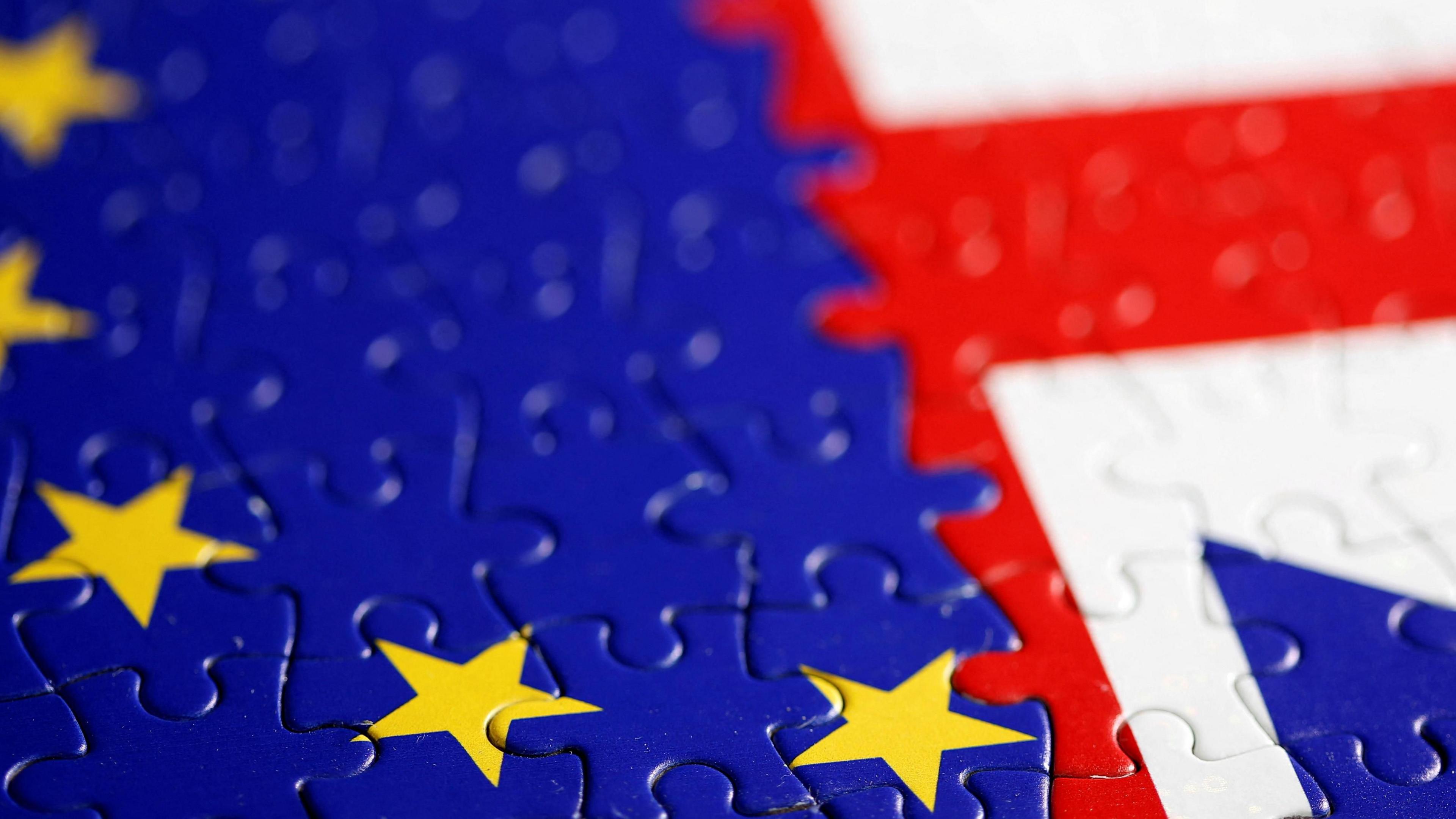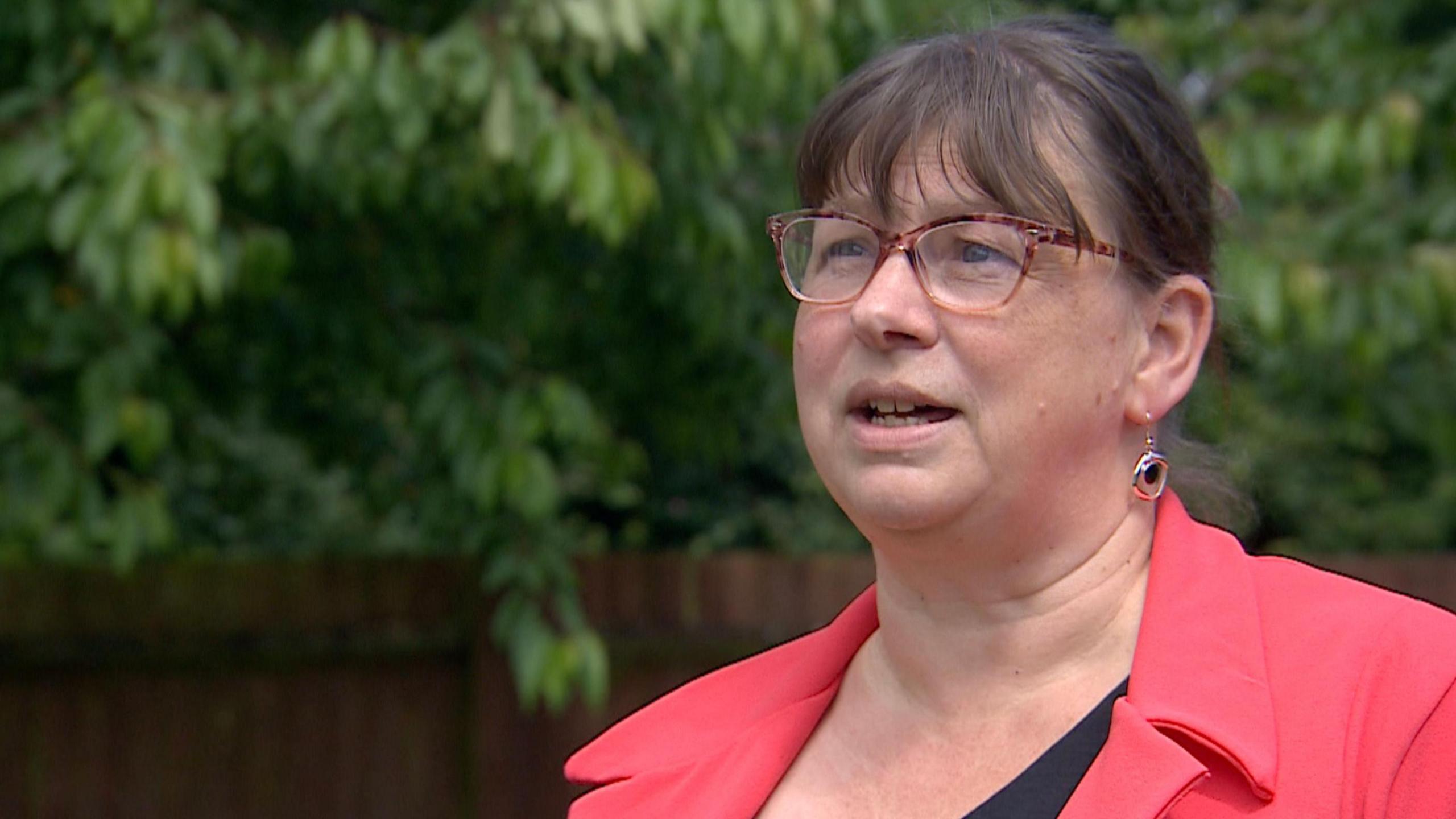'Guitar exports used to take 48 hours - now it's three weeks'

Steve Toon has lost half his European guitar sales after Brexit
- Published
A man who makes high-end guitars says Brexit has meant exporting his instruments has gone from 48 hours to three weeks.
Steve Toon added the process has gone from costing £60 to £240 with his hand-crafted items often turning up late and "trashed".
“It’s become actually quite difficult to trade. My European sales have dropped off by 50%," he said.
Steve, from Gloucester, does not want to rejoin the EU. He was one of many people who have contacted the BBC's Your Voice, Your Vote and wanted to know why parties are avoiding discussing Brexit.

Steve Toon has sold hand made classical guitars for 30 years
Courier firms now have to complete complex customs declarations, and pay tariffs on his guitars. Many now refuse his trade altogether.
Steve Toon is not alone.
The Economist newspaper reported, external higher trade barriers had seen the export of goods from the UK shrink by 10% since 2019.
The Independent Office for Budget Responsibility, external estimates Brexit has made the UK economy 4% smaller than it might have been.
Mr Toon does not want Britain to rejoin the EU, or even the single market. He just wants politicians to come up with a plan to get his guitars across the channel in under a month.
But in this election, politicians have stopped talking about Brexit.
“They want to talk about a growth strategy, I don’t see how you can talk about a growth strategy without talking about the big elephant in the room – which is Brexit.”

Plenty of others agree with Steve.
When we asked readers through our Your Voice, Your Vote what issues they most wanted discussed in the election, many had one simple question.
As Stephen Lawes from Wiltshire put it: “Why are all major parties refusing to debate Brexit?”
Five years ago, the General Election was about nothing else. Boris Johnson pledged famously to “Get Brexit Done”, and won a landslide.
Today, the parties have dropped Brexit to a footnote.

Brexit is "the elephant in the room" for Jane Kenchington
Jane Kenchington, from North Nibley in Gloucestershire, put it like this.
“Discussion on the dire economic consequences of Brexit seem to have been avoided in every interview I have watched.”
Our mailbag is not scientific, and perhaps unsurprisingly more people wrote to complain about Brexit than to say they were happy with progress.
But all agreed that the parties seem to be staying off the subject.
Tim Cottrill, from Wiltshire, said: “It is odd that major parties can barely bring themselves to mention the word.”

Divisions over Brexit dominated the 2019 election but have been largely ignored in 2024
In their public campaigning and TV debates, none of the main parties have raised the topic of Brexit.
Comb the manifestos, though and you can find Brexit policies if you look hard enough.
The Tories’ pledge document runs to 26,916 words.
The word “Brexit” appears 12 times.
Labour’s manifesto is equally long, 26,606 words.
“Brexit” appears just once.

"None of them want to upset leave voters", says Prof Paula Surridge of Bristol University
Prof Paula Surridge has an idea what is going on.
She explained: “They’re all trying to keep quiet about Brexit because none of them want to upset the leave voters who voted Conservative in 2019, and now are heading off to different parties.”
Prof Surridge teaches politics and sociology at Bristol University, analysing polls and voting behaviour to understand what makes people tick.
Brexit, she says, is a touchy subject.
“It’s not a good look if you’re trying to win them over to say, ‘you were wrong, you were wrong’.
“In the South West the Liberal Democrats don’t want to talk about Brexit because they’re trying to win over Conservative voters.
“Elsewhere in the country, Labour have managed to win over some leave voters, and they don’t want to lose those either.”
But for some of our readers, that approach is too cynical.
Jane Kenchington emailed from North Nibley, in Gloucestershire.
“It has been put in the too difficult box,” the retired vicar told me.
“We don’t want to offend red wall voters, and we don’t want to play into the hands of Farage. But actually we can’t ignore it.
"They’re afraid of losing votes rather than doing what I think is right for the country.”
So what do the parties say on Brexit?
Party Pledges
Conservatives
Most mentions of Brexit in the Conservative Manifesto, external are claims that the Tory government has improved life after the UK left the EU.
For example, “ We have used post-Brexit tax freedoms including replacing complex EU alcohol duty rates.”
In future, the party pledges further measures such as:
“Seize the benefits of Brexit by signing further trade deals, speeding up infrastructure and unblocking 100,000 homes, cutting red tape for business, and creating new fishing opportunities.”
Labour
Out of 11 policy areas addressed in Labour’s manifesto, external, Brexit appears in the tenth, called “Britain Reconnected”.
“With Labour, Britain will stay outside of the EU. But to seize the opportunities ahead, we must make Brexit work.”
The party insists it will not rejoin the European Single Market or the Customs Union.
“Instead, Labour will work to improve the UK’s trade and investment relationship with the EU, by tearing down unnecessary barriers to trade.”

The Liberal Democrats, external have long campaigned for a ‘second referendum’ to rejoin the EU outright. That ambition is now in the far future. Their manifesto instead wants much closer agreements with the EU, culminating in this pledge:
“We would aim to place the UK-EU relationship on a more formal and stable footing by seeking to join the Single Market.”
What of the one party that owes its existence to the Brexit debate?
On the front page of Reform's manifesto, external, the third line loudly proclaims:
“Brexit is the opportunity of a lifetime.”
But it is actually page 15 before any post-Brexit policies are detailed.
The party wants to scrap the remaining laws that originated in the EU, some 6,000 of them. They would leave the European Court of Human Rights, and tear up the Windsor Framework which brought a settlement to Northern Ireland.
The Green Party, external is the most clearly pro-European manifesto. But you have to read to page 43 to find a pledge to “Re-join the EU as soon as the domestic political situation is favourable and EU member states are willing.”
The party wants to rejoin the Customs Union in the meantime, and promises a “speedy” retrn to the free movement of people across UK/EU borders.
What really matters to you in this general election? What is the one issue that will influence your vote? Click the button below to submit your idea, and it could be featured on the BBC.
Is Brexit talk a 'poisoned chalice' for politicians?
- Published11 June 2024
Why do fishermen feel disillusioned after Brexit?
- Published16 June 2024
UK can do better than Johnson's 'botched' post-Brexit trade deal - Starmer
- Published14 June 2024